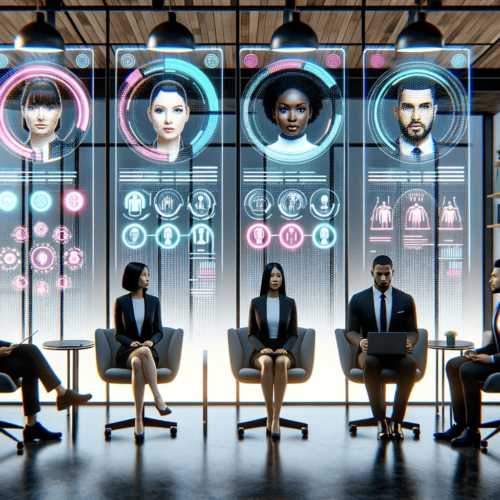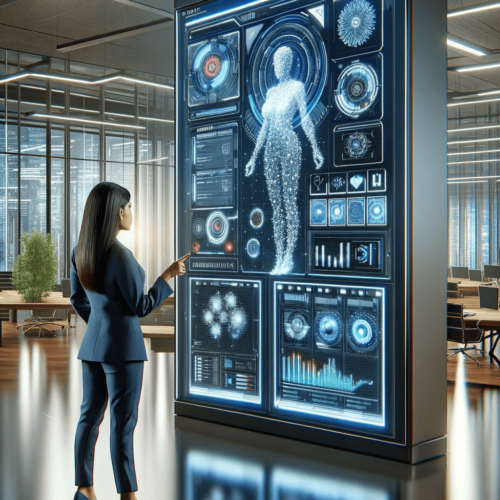Why AI Recruiting Software is Revolutionising the Hiring
The Evolution of Recruitment
Recruitment has undergone significant transformations over the years. From the traditional methods of job advertisements in newspapers and word-of-mouth referrals, the industry has embraced the digital era with the advent of online job portals and social media channels. This shift not only broadened the reach for potential candidates but also introduced a new level of complexity in managing and processing the influx of job applications. As the volume and diversity of applications increased, the need for more efficient, precise, and unbiased recruitment processes became evident. This need paved the way for the emergence of AI recruiting software, offering a blend of innovation and efficiency to the recruitment landscape.
The Rise of AI in Recruitment
The integration of Artificial Intelligence (AI) in recruitment represents a paradigm shift in how employers attract, screen, and hire candidates. AI recruiting software, with its ability to learn and adapt through algorithms, has revolutionised the recruitment process by automating mundane tasks, enhancing candidate targeting, and improving the overall quality of hires. This technology is not only about replacing human decision-making but augmenting it by providing valuable insights and data-driven recommendations. The rise of AI in recruitment is a response to the growing complexity of the job market and the increasing demand for a more strategic, efficient, and unbiased approach to hiring.
Understanding AI Recruiting Software
Defining AI Recruiting Software
AI recruiting software refers to the application of artificial intelligence technology in the recruitment process. It encompasses a range of tools and platforms that leverage machine learning, natural language processing, and predictive analytics to streamline and enhance various aspects of recruiting. This software is designed to automate repetitive tasks such as resume screening and initial candidate assessments, allowing recruiters to focus on more strategic elements of their role. Additionally, AI recruiting tools are capable of analysing large sets of data to identify patterns and insights that can improve decision-making in recruitment.
How AI Recruitment Tools Work
AI recruitment tools work by utilising algorithms that learn from data to perform specific recruitment tasks. These tasks can range from parsing and interpreting resumes to assessing a candidate’s suitability for a role based on their skills, experience, and other relevant attributes. The software typically integrates with existing recruitment systems, sourcing candidates from various channels and databases. It then applies machine learning techniques to refine its search and selection criteria based on feedback and outcomes, thereby continuously improving its effectiveness. AI tools also employ natural language processing to understand and interact with candidates, providing a more engaging and personalised experience throughout the recruitment process.
Key Features of AI Recruiting Software
Automated Screening
Automated screening represents a cornerstone feature of AI recruiting software, designed to efficiently handle the initial stages of candidate evaluation. By leveraging algorithms, the software can quickly sift through large volumes of applications, identifying those candidates whose qualifications, experience, and skills best match the job requirements. This automation not only speeds up the recruitment process but also ensures a more consistent and objective approach to initial candidate screening. The ability to rapidly filter out unsuitable applicants allows recruiters to focus their efforts on the most promising candidates, enhancing the overall effectiveness of the recruitment process.
Enhancing Candidate Experience
AI recruiting software plays a pivotal role in enhancing the candidate experience. In today’s competitive job market, the candidate experience is as crucial as the employer’s brand. AI tools contribute to a more engaging and interactive application process, providing timely feedback and communication. They can automate responses to common queries and keep candidates informed about their application status, which helps in maintaining a positive perception of the employer. Moreover, AI-driven personalised recommendations and job suggestions based on a candidate’s profile and past applications can significantly improve their experience and likelihood of finding a suitable role.
Intelligent Matching
Intelligent matching is a pivotal feature of AI recruiting software, offering a significant advantage over traditional recruitment methods. This feature employs advanced algorithms to analyse a candidate’s skills, experience, and various other attributes, and then cross-references this information with the specific requirements of the job. This process not only ensures a high degree of compatibility between the job and the candidate but also uncovers potential matches that might be overlooked in manual screening processes. Intelligent matching helps in identifying candidates who are not just qualified for the position but are also likely to align well with the company’s culture and values, leading to better long-term employment outcomes.
Improving Job Fit Accuracy
Improving job fit accuracy is an essential aspect of AI recruiting software. Traditional recruitment methods can often result in hires that are not the best fit for the job, leading to high turnover rates and associated costs. AI-driven recruitment tools address this challenge by using predictive analytics and machine learning to assess the likelihood of a candidate’s success in a particular role. By analysing historical data and patterns, these tools can predict job fit with a higher degree of accuracy, thereby reducing the chances of mis-hires. This precision not only improves the quality of hires but also contributes to higher employee satisfaction and retention rates.
Data-Driven Decision Making
Data-driven decision making is at the heart of AI recruiting software. In an era where data is abundant, the ability to effectively utilise this data for informed decision-making is crucial. AI recruiting tools are equipped to process and analyse large volumes of data, deriving insights that are beyond the reach of human capabilities. This includes identifying trends in the job market, understanding candidate behaviour, and predicting future hiring needs. By basing decisions on data rather than intuition, recruiters can enhance the effectiveness of their recruitment strategies, aligning them more closely with the organisation’s goals and needs.
Leveraging Big Data in Recruitment
Leveraging big data in recruitment is a key advantage of AI recruiting software. Big data in the context of recruitment encompasses a wide array of information, from candidate resumes and application forms to social media profiles and online behaviour. AI tools are capable of processing this vast and varied data to extract meaningful insights. This includes identifying skills gaps in the current workforce, predicting the success of candidates in specific roles, and even anticipating future hiring needs. The use of big data not only enhances the efficiency and accuracy of the recruitment process but also enables a more strategic approach to talent acquisition.
Reducing Human Bias
Reducing human bias is a critical function of AI recruiting software. Despite best efforts, human recruiters can be susceptible to unconscious biases, which can affect the fairness and objectivity of the hiring process. AI tools, designed to evaluate candidates based on predefined criteria and data, can significantly reduce the influence of such biases. By ensuring that candidates are assessed purely on their skills, experience, and suitability for the role, AI recruiting software promotes a more inclusive and equitable recruitment process. However, it is important to note that AI systems are only as unbiased as the data and algorithms they are based on, necessitating careful design and regular monitoring to avoid perpetuating existing biases.

Benefits of Using AI in Recruitment
Efficiency and Time Saving
One of the most significant benefits of using AI in recruitment is the efficiency and time savings it offers. The traditional recruitment process can be time-consuming, involving numerous steps from sourcing candidates to scheduling interviews. AI recruiting software automates many of these tasks, such as screening resumes and initial candidate communications, drastically reducing the time spent on administrative aspects. This automation allows recruiters to focus on more high-value activities, such as engaging with shortlisted candidates and refining hiring strategies. The time saved not only accelerates the hiring process but also enables a more responsive and dynamic approach to talent acquisition.
Reducing Administrative Burden
Reducing the administrative burden is another key benefit of AI in recruitment. The recruitment process involves a plethora of administrative tasks, from managing candidate databases to coordinating interview schedules. These tasks, while necessary, can be mundane and time-consuming, diverting resources from more strategic recruitment initiatives. AI recruiting software alleviates much of this burden by automating routine tasks, such as sorting through applications and scheduling interviews. This automation not only streamlines the recruitment process but also reduces the likelihood of human error, ensuring a more efficient and reliable approach to recruitment administration.
Improved Candidate Quality
AI recruiting software significantly enhances the quality of candidates reaching the final stages of the hiring process. By leveraging sophisticated algorithms and comprehensive data analysis, these tools can identify candidates who not only meet the basic job requirements but also possess the potential to excel in the role. This refinement in candidate quality stems from a deeper understanding of the skills, experiences, and attributes that correlate with success in specific positions. AI-driven recruitment ensures a more targeted approach, focusing on candidates who are most likely to contribute positively to the organisation and thrive in its culture.
Accessing a Wider Talent Pool
AI recruiting software plays a crucial role in accessing a wider talent pool. Traditional recruitment methods can be limited by geographical boundaries and the reach of personal networks. AI tools, on the other hand, can scour a vast array of digital platforms and databases, tapping into a global pool of candidates. This expansive reach is particularly beneficial in sourcing candidates with rare skills or in industries facing talent shortages. By broadening the scope of the search, AI recruiting software ensures a more diverse and comprehensive selection of candidates, enhancing the overall quality of hires.
Cost Reduction
Implementing AI in the recruitment process can lead to significant cost reductions. The traditional hiring process can be expensive, encompassing advertising costs, recruiter fees, and the time spent by HR personnel on various recruitment activities. AI recruiting software reduces these costs by automating several stages of the recruitment process, particularly the initial screening and sorting of applications. This reduction in manual labour and time expenditure directly translates into cost savings. Moreover, by improving the accuracy of candidate selection, AI-driven recruitment minimises the costs associated with poor hires, such as turnover and retraining expenses.
Long-Term Financial Benefits
The long-term financial benefits of using AI in recruitment are substantial. Beyond the immediate cost savings, AI recruiting tools contribute to the overall financial health of an organisation by enhancing the quality of hires. Better quality hires mean increased employee productivity, reduced turnover rates, and a stronger alignment with the company’s strategic objectives. These factors collectively contribute to a more efficient and effective workforce, driving long-term financial gains. Additionally, the data-driven insights provided by AI tools can inform future recruitment strategies, leading to more strategic and cost-effective hiring decisions over time.
Challenges and Considerations
Ethical Implications
The ethical implications of using AI in recruitment are a critical consideration. While AI tools offer numerous benefits, they also raise concerns regarding privacy, data security, and potential biases. Ensuring that AI recruiting software is designed and used in an ethical manner is paramount. This includes safeguarding candidate data, ensuring transparency in how AI decisions are made, and regularly auditing the algorithms to prevent discriminatory practices. Addressing these ethical concerns is essential not only for legal compliance but also for maintaining candidate trust and the integrity of the recruitment process.
Addressing Bias and Fairness
Addressing bias and fairness is a significant challenge in AI-driven recruitment. While AI has the potential to reduce human bias, it can also perpetuate existing prejudices if not carefully managed. This is because AI algorithms learn from historical data, which may contain biased human decisions. Ensuring fairness in AI recruitment requires a deliberate effort to design algorithms that are as objective as possible and to continuously monitor their outcomes for signs of bias. This might involve using diverse training data, employing fairness-focused machine learning techniques, and involving human oversight in critical decision-making stages.
Integration and Adaptation
Integrating AI recruiting software with existing HR systems and processes can be a complex undertaking. It requires careful planning and execution to ensure that the new tools seamlessly complement and enhance the existing infrastructure. This integration process often involves technical challenges, such as data compatibility and system interoperability. Additionally, there is a need for adaptation on the part of HR teams and other stakeholders. Training and support are crucial in enabling HR personnel to effectively utilise AI tools and integrate them into their daily workflows. The successful integration and adaptation of AI in recruitment hinge on a combination of technical proficiency and change management strategies.
Training and Adaptation for HR Teams
Training and adaptation for HR teams are essential for the effective implementation of AI recruiting software. The introduction of AI tools represents a shift in how recruitment is traditionally conducted, necessitating a new set of skills and knowledge for HR professionals. Training should focus not only on the technical aspects of using the software but also on understanding the underlying AI principles and how they impact recruitment practices. Furthermore, HR teams must adapt to a more data-driven approach, leveraging the insights provided by AI to inform their strategies and decisions. Effective training and support are key to ensuring that HR teams can maximise the benefits of AI in recruitment, while also maintaining a human touch in the hiring process.
The Future of AI in Recruitment
Predicting Trends and Innovations
The future of AI in recruitment is poised for continued evolution and innovation. As technology advances, we can expect to see more sophisticated AI tools with enhanced capabilities in areas such as predictive analytics, natural language processing, and even emotion recognition. These advancements will further refine the recruitment process, enabling more precise candidate matching and deeper insights into candidate potential. Additionally, trends such as the integration of AI with other emerging technologies like virtual reality for immersive interview experiences and blockchain for secure credential verification are likely to gain traction. These innovations will not only transform how recruitment is conducted but will also redefine the candidate experience and the role of HR professionals.
The Role of AI in Shaping Recruitment Strategies
The role of AI in shaping recruitment strategies is becoming increasingly significant. As organisations strive to remain competitive in a rapidly changing job market, AI-driven recruitment tools offer a strategic advantage. These tools enable a more proactive approach to talent acquisition, predicting future hiring needs, and identifying potential candidates before a vacancy even arises. AI’s ability to provide deep insights into the labour market and talent trends will also inform long-term recruitment planning, helping organisations to anticipate and prepare for future skills requirements. In this way, AI is not just a tool for improving the efficiency of recruitment processes but a strategic asset that shapes the future workforce of an organisation.

Frequently Asked Questions
1. What is AI Recruiting Software?
Answer: AI recruiting software is a type of application that uses artificial intelligence technologies like machine learning and natural language processing to automate and enhance various aspects of the recruitment process. It includes features like automated screening, intelligent matching, and data-driven decision making, aimed at improving efficiency, reducing bias, and enhancing the quality of hires.
2. How Does AI Improve the Recruitment Process?
Answer: AI improves the recruitment process by automating time-consuming tasks like resume screening, providing intelligent candidate matching based on comprehensive data analysis, and reducing human biases in the hiring process. This leads to more efficient and effective recruitment, saving time and resources while improving the quality of candidate selection.
3. Can AI Recruiting Software Reduce Unconscious Bias in Hiring?
Answer: Yes, AI recruiting software can help reduce unconscious bias in hiring. By relying on algorithms to evaluate candidates based on their skills and experiences rather than subjective criteria, AI can offer a more objective and fair assessment. However, it is essential to ensure that the AI algorithms themselves are free from biases.
4. What Features Should I Look for in AI Recruiting Software?
Answer: When selecting AI recruiting software, look for features like automated candidate screening, intelligent job-candidate matching, predictive analytics, integration capabilities with existing HR systems, and tools for reducing bias. User-friendly interfaces and compliance with data privacy and security standards are also important.
5. How Does AI Recruiting Software Integrate with Existing HR Systems?
Answer: AI recruiting software typically integrates with existing HR systems through APIs or other integration tools. This allows for seamless data transfer and functionality between systems, enabling recruiters to manage all recruitment-related activities within a unified platform.
6. What are the Ethical Considerations of Using AI in Recruitment?
Answer: Ethical considerations include ensuring data privacy and security, avoiding algorithmic bias, and maintaining transparency in AI-driven decisions. It’s important to regularly audit and update AI algorithms to ensure fairness and compliance with legal and ethical standards.
7. How Can AI Improve the Candidate Experience?
Answer: AI can improve the candidate experience by providing timely and relevant communication, personalising the recruitment journey, and offering interactive and engaging assessment tools. AI-driven systems can also give candidates feedback and suggestions, enhancing their engagement with the recruitment process.
8. What Challenges Might Arise with Implementing AI Recruiting Software?
Answer: Challenges include ensuring data accuracy and integrity, integrating AI tools with existing HR systems, training HR teams to use the software effectively, and addressing potential ethical concerns. Ongoing management and updating of AI systems are also necessary to maintain their effectiveness.
9. How Does AI in Recruitment Facilitate Data-Driven Hiring Decisions?
Answer: AI in recruitment facilitates data-driven decisions by analysing vast amounts of candidate data, identifying trends and patterns, and providing predictive insights. This helps recruiters make informed decisions based on comprehensive data analysis rather than solely on intuition or experience.
10. What Future Developments are Expected in AI Recruiting Software?
Answer: Future developments in AI recruiting software may include more advanced predictive analytics, enhanced natural language processing capabilities, integration with emerging technologies like blockchain for credential verification, and further innovations in reducing biases and enhancing candidate engagement.



